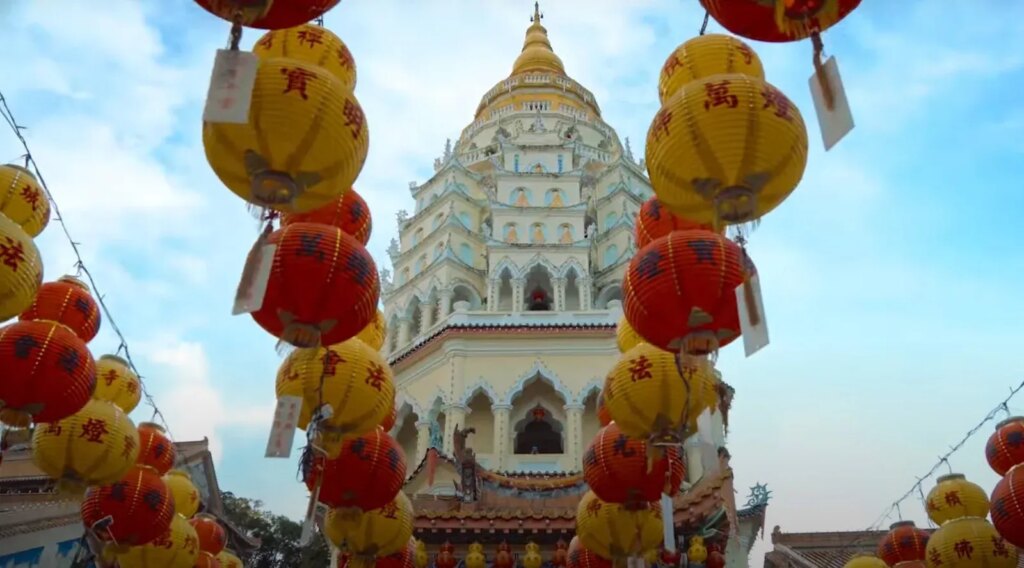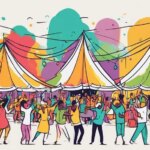Stunning Malaysia beckons travellers with its vibrant cultural diversity and rich heritage showcased prominently through a wide array of festivals celebrated throughout the year.
This Southeast Asian gem, with its unique blend of traditions influenced by British colonial rule and a strong Chinese community, offers a melting pot of celebrations that highlight the nation’s multicultural identity and religious tolerance.
From the piercing rituals of Thaipusam to the vibrant festivities of Chinese New Year, Malaysia’s festivals offer a glimpse into its captivating customs and traditions.
Thaipusam – A Spiritual Spectacle
For the Tamil Hindu community in Malaysia, Thaipusam holds immense spiritual significance as they gather to honour Lord Murugan’s victory over evil. This vibrant celebration is marked by a deeply spiritual atmosphere as devotees come together to express their faith and devotion. The festival is a time of prayer, penance, and thanksgiving, with participants seeking blessings and guidance from the deity.
Rituals and Customs of Thaipusam in Malaysia
Any discussion of Thaipusam in Malaysia is incomplete without mentioning the piercing rituals that are a central aspect of the festival. Devotees often perform acts of self-mortification as a form of penance and purification, showcasing their dedication to Lord Murugan. The colourful processions and offerings made during Thaipusam create a mesmerizing sight, drawing in spectators from all walks of life.
A visit to the Batu Caves near Kuala Lumpur during Thaipusam is a truly unforgettable experience, as devotees carry kavadis adorned with fruits, flowers, and other decorations while climbing the staircase leading to the temple.
The rhythmic sounds of drums and chants fill the air, adding to the spiritual energy of the event. Thaipusam in Malaysia is not only a religious festival but also a cultural extravaganza that showcases the deep-rooted traditions of the Tamil Hindu community.
Malaysia Water Festival – A Splash of Merriment
Even in a country known for its rich multicultural heritage and diverse festivals, the Malaysia Water Festival in April stands out as a unique celebration that brings people together for water-based activities along the beaches.
This festival not only promotes fun and community spirit but also showcases the country’s love for outdoor sports and recreational activities.
Community Engagement and Coastal Celebrations
Games, cultural performances, and festivities mark the Malaysia Water Festival, attracting both locals and tourists to join in the celebration. This annual event is a great opportunity for community engagement, as people from all backgrounds come together to enjoy the festivities by the coastlines, celebrating the vibrant spirit of Malaysia’s cultural diversity.
With a wide array of water-based activities and beach games to partake in, the Malaysia Water Festival offers a unique opportunity for visitors to immerse themselves in the lively atmosphere of the coastal celebrations and experience the sense of unity and togetherness that define Malaysian culture.
Chinese New Year – The Red Festivity
Traditions and Practices of Chinese New Year
Throughout Malaysia, the vibrant and auspicious celebration of Chinese New Year holds a special place in the hearts of its people. An imperative time of renewal and family bonding, this 15-day festivity marks the beginning of the lunar new year, with each year dedicated to a specific zodiac animal.
An estimated one-third of Malaysia’s population engages in this joyous occasion, making it one of the largest celebrations in the country.
Lion Dances, Firecrackers, and Reunion Dinners
On the eve of Chinese New Year, the streets come alive with the mesmerizing spectacle of lion dances, and the crackling sound of firecrackers filling the air as families gather for sumptuous reunion dinners.
This tradition is a symbol of warding off evil spirits and attracting good luck and fortune for the year ahead. The festive atmosphere is heightened as red lanterns adorn homes and streets, signifying prosperity and happiness.
Understanding the significance of lion dances, firecrackers, and reunion dinners during Chinese New Year allows for a deeper appreciation of the cultural heritage and traditions that shape Malaysia’s rich multicultural landscape. These practices bring communities together in unity and harmony, fostering a sense of kinship and cultural pride.
Hari Raya Aidil Fitri – The Joyful End of Ramadan
To experience the vibrant cultural diversity of Malaysia, one must not miss celebrating Hari Raya Aidil Fitri, also known as Eid al-Fitr. This significant festival marks the end of Ramadan, the Islamic holy month of fasting. Celebrated by over half of Malaysia’s population, Hari Raya Aidil Fitri is a time of joy, feasting, and community bonding.
Feasting and Forgiving: The Cornerstones of Hari Raya
Aidil Fitri is a time for families and friends to come together, forgive past grievances, and strengthen bonds over delicious traditional cuisines. The act of forgiveness, known as ‘bermaaf-maafan’, plays a central role during this festive season, promoting harmony and unity among Malaysians of diverse backgrounds.
Deepavali – The Triumph of Light
The Symbolism Behind Deepavali
After the sun sets over Malaysia, the country comes alive with the dazzling lights of Deepavali, also known as Diwali, the ‘festival of lights’. This vibrant festival signifies the victory of light over darkness and good over evil, reflecting the triumph of knowledge over ignorance. Celebrated by millions of Hindus worldwide, Deepavali is a time of joy, reflection, and renewal.
Festival Activities: Lights, Fireworks, and Festive Foods
One of the most striking features of Deepavali celebrations in Malaysia is the elaborate decorations with colourful ‘rangoli’ patterns adorning homes and streets. The night sky comes alive with mesmerizing firework displays, symbolizing the victory of light.
Families come together for sumptuous feasts of traditional delicacies, such as ‘sweets’ and savoury snacks, adding a delicious touch to the festivities.
The festival also involves the exchange of gifts and the sharing of ‘sweets’ with loved ones and neighbours, fostering a sense of unity and generosity within communities. In Malaysia, Deepavali is a time when temples are adorned with flowers and lights, and prayers and devotional songs fill the air, creating a spiritually uplifting atmosphere.
Wesak Day – The Golden Glow of Buddhism
Not only is Malaysia known for its vibrant cultural diversity and religious tolerance, but it also showcases the beauty of Buddhism through its grand Wesak Day celebrations.
This important Buddhist festival commemorates the birth, enlightenment, and nirvana of Lord Buddha, drawing devotees and visitors alike to participate in various spiritual and cultural activities.
Buddha’s Lessons and their Relevance Today
On this auspicious day, Buddhists reflect upon the teachings of Lord Buddha and their significance in modern times. The values of compassion, mindfulness, and non-violence espoused by Buddha hold timeless relevance in our fast-paced, often chaotic world.
As devotees gather to offer prayers, meditate, and engage in acts of charity, the spirit of Wesak Day serves as a reminder of the importance of inner peace and harmony in today’s society.
The Grand Wesak Day Procession
Any discussion of Wesak Day in Malaysia would be incomplete without mentioning the grand Wesak Day procession that takes place in various parts of the country. Led by Buddhist monks and devotees, the procession features colourful floats, traditional performances, and solemn rituals that captivate both participants and onlookers alike.
The sights and sounds of the procession create a mesmerizing experience that highlights the deep-rooted traditions and spiritual devotion of the Buddhist community in Malaysia.
With the grand procession as the centrepiece of Wesak Day festivities, visitors are treated to a visual feast of intricate decorations, chanting monks, and vibrant ceremonies that pay homage to the life and teachings of Lord Buddha.
The procession not only showcases the artistic and cultural wealth of Malaysia but also offers a profound insight into the spiritual beliefs and practices of Buddhism, inviting attendees to immerse themselves in a centuries-old tradition that continues to inspire and enlighten.
The Rainforest World Music Festival – Rhythms in Nature’s Amphitheatre
To truly immerse yourself in the vibrant cultural tapestry of Malaysia, look no further than The Rainforest World Music Festival. This three-day extravaganza, held at the Sarawak Cultural Village in July, is a celebration of diverse sounds and rhythms that reflect the country’s rich multicultural heritage.
With live performances from both local and international artists, the festival showcases a unique fusion of traditional and contemporary music that will captivate your senses.
Cultural Experiences and Musical Workshops
Music enthusiasts and cultural connoisseurs alike will find themselves immersed in a plethora of experiences at The Rainforest World Music Festival. From interactive workshops to enlightening cultural exchanges, attendees have the opportunity to investigate deeper into the roots of the music being showcased.
Expand your musical horizons through hands-on workshops and engage with artists who are masters of their craft, providing a truly unforgettable experience.
Explore the diverse sounds and rhythms of Malaysia and beyond, all within the enchanting backdrop of the lush rainforest. Dive into the heart of the music, where traditions merge with innovation, creating a harmonious symphony that echoes through nature’s amphitheatre.
Kaamatan Harvest Festival – A Thanksgiving of the Kadazan-Dusun
Now, let’s probe into the vibrant and culturally rich Kaamatan Harvest Festival of the Kadazan-Dusun tribe in Sabah, Malaysia. This traditional festival, celebrated annually in May, is a time for the community to give thanks for the bountiful harvest and seek blessings for the upcoming planting season.
The festival is a reflection of the tribe’s deep agricultural roots and close connection with the land.
The Rituals of Kaamatan
Harvest celebrations during the Kaamatan Festival involve a series of traditional rituals that honour the spirits of the rice paddy and seek protection for the crops. Highlights include the ‘Monogit’ (ritual chanting), ‘Mogigol’ (the first rice harvesting ceremony), and ‘Magavau’ (offering ceremonies).
These rituals are performed with reverence and gratitude, creating a spiritual ambience that ties the community together in harmonious celebration.
The Cultural Panorama of the Harvest Festival
Rituals during the Kaamatan Harvest Festival are accompanied by a colourful display of cultural activities, including traditional dances, music performances, and sporting events.
The festival offers a glimpse into the vibrant Kadazan-Dusun culture, showcasing their unique customs and traditions that have been passed down through generations. Visitors to the Kaamatan Harvest Festival can immerse themselves in the sights, sounds, and flavours of this indigenous celebration, gaining a deeper appreciation for Malaysia’s diverse cultural heritage.
To wrap up
Conclusively, Malaysia’s vibrant cultural diversity and religious tolerance shine through its stunning array of festivals that showcase the country’s rich customs, traditions, and multicultural heritage.
Malaysia’s festival calendar is a vibrant showcase, from the vivid Thaipusam and Chinese New Year celebrations to the solemn Hari Raya Aidil Fitri and Wesak Day.
Each festival provides a special chance to delve into Malaysia’s cultural richness. Whether it’s Deepavali’s spiritual essence, the Rainforest World Music Festival’s dynamic rhythms, or the Kaamatan Harvest Festival’s age-old customs, there’s something for everyone to relish and admire in Malaysia’s varied festivities.
Frequently Asked Questions
What are the major cultural festivals celebrated in Malaysia?
Malaysia’s rich cultural tapestry is highlighted through various festivals such as Hari Raya Aidilfitri, Chinese New Year, Wesak Day, and the Gawai Festival. These festivals reflect the multicultural makeup of the country, showcasing traditions and customs from the Malay, Chinese, Indian, and indigenous communities.
When is the best time to visit Malaysia to experience its festivals?
For those looking to immerse themselves in Malaysia’s festival spirit, visiting Hari Raya, Chinese New Year, or the Rainforest World Music Festival would offer unique cultural experiences. These periods highlight the diverse cultural heritage and provide visitors with a chance to partake in the festivities.
What are the unique customs and traditions associated with Malaysian festivals?
Malaysian festivals are characterized by open houses, traditional clothing, and the use of lanterns. Each festival has its own set of customs and rituals that are steeped in religious and cultural significance, providing a deep insight into the values and traditions of the Malaysian people.
Can you recommend some festivals that showcase the diverse cultural heritage of Malaysia?
Festivals such as Hari Raya, Chinese New Year, and Thaipusam are excellent showcases of Malaysia’s cultural diversity. They reflect the rich traditions and customs of Malaysia’s various ethnic groups, offering visitors a glimpse into the country’s vibrant cultural scene.



